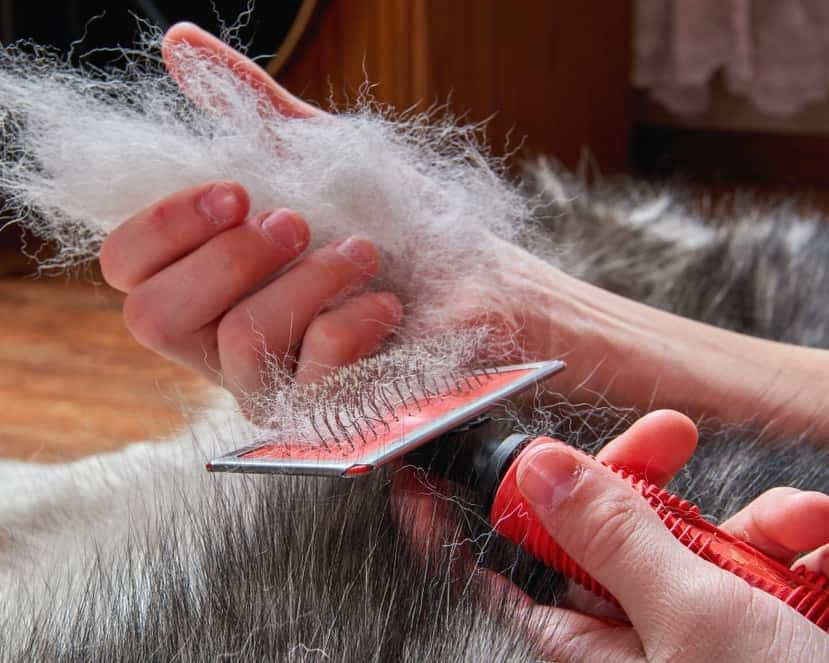
-
Find the right food for your petTake this quiz to see which food may be the best for your furry friend.Find the right food for your petTake this quiz to see which food may be the best for your furry friend.Featured products
 Perfect Digestion Small & Mini Adult Dog Food
Perfect Digestion Small & Mini Adult Dog FoodHill's Science Plan Perfect Digestion Small & Mini Adult Dog Food with Turkey is a complete premium pet food for small breed adult dogs aged 1–6 years. This deliciously smooth mousse is precisely balanced to deliver the appropriate amount of energy and to support digestive health in adult, small breed dogs.
Shop Now Hypoallergenic Small & Mini Adult Dog Food
Hypoallergenic Small & Mini Adult Dog FoodHILL'S SCIENCE PLAN Hypoallergenic Small&Mini Adult dog food with Salmon is complete pet food for adult small dogs 1–6 years old. It's formulated for dogs with delicate skin and stomach, with limited high quality novel protein sources & no grain.
Shop Now Perfect Weight Small & Mini Adult Dog Food
Perfect Weight Small & Mini Adult Dog FoodHill's Science Plan Adult Small & Mini Dog Food with Turkey is a complete premium pet food for adult small dogs from 1 year old that are prone to weight gain or slightly overweight. This deliciously smooth mousse is formulated to deliver the appropriate amount of energy to support weight maintenance in adult dogs.
Shop NowFeatured products Sterilised Mature Adult Cat Food
Sterilised Mature Adult Cat FoodHill's Science Plan Sterilised Cat Mature Adult Cat Food with Chicken is specially formulated with ActivBiome+ Multi-Benefit Technology. It is a precisely balanced nutrition tailored to meet the needs of mature adult sterilised cats, ages 7+, and to promote graceful ageing.
Shop Now Oral Care Adult Cat Food
Oral Care Adult Cat FoodHill's Science Plan Oral Care Adult Cat Food with Chicken contains clinically proven kibble technology to reduce plaque & tartar build up.
Shop Now Urinary Health Adult Cat Food with Chicken
Urinary Health Adult Cat Food with ChickenHill's Science Plan Urinary Health Adult Cat Food with Chicken supports the health of the whole urinary system. Suitable for sterilised cats.
Shop Now -
Dog
- Dog Tips & Articles
-
Health Category
- Weight
- Food & Environmental Sensitivities
- Urinary
- Digestive
- Joint
- Kidney
-
Life Stage
- Puppy Nutrition
- Adult Nutrition
- Senior Nutrition
Cat- Cat Tips & Articles
-
Health Category
- Weight
- Skin & Food Sensitivities
- Urinary
- Digestive
- Kidney
-
Life Stage
- Kitten Nutrition
- Adult Nutrition
Featured articles Tips For Mixing Wet And Dry Pet Food
Tips For Mixing Wet And Dry Pet FoodDiscover tips for mixing wet and dry pet food to ensure balanced nutrition and variety for your pet. For comprehensive feeding advice, visit Hill's Pet UK.
Read More Virtual Vet Visits: What You Need to Know
Virtual Vet Visits: What You Need to KnowLearn the ins and outs of a televet appointment before you talk to a vet online.
Read More Develop your gut instinct | Hill's Pet
Develop your gut instinct | Hill's PetDigestive disorders can affect any part of the digestive system, from the stomach, small intestine and through to the large intestine.
Read More -


Hair loss in dogs — also known as alopecia — is common and normally quite noticeable. Hair loss can appear in a single spot, in patches, or all over the body. If you have a dog losing hair at home, you may wonder why and whether you need to seek advice from your vet. There are many things that can cause a dog to lose hair, but it's likely that your not-so-furry friend is going bald for one of five common reasons.

1. Seasonal Shedding
Sometimes, seemingly extreme dog hair loss is just normal shedding. Dogs lose fur when the individual hairs become old or damaged, or seasonally when the weather turns warm. Many dogs shed year-round, especially because so many now live indoors with central heating. Some breeds, like huskies and Labradors, grow thick winter undercoats that they shed in the spring. Seasonal shedding is often reduced if you live in a moderate climate. If the shedding is out of control, brushing your dog two or three times a week can remove and control excess hair.
2. Bacterial and Fungal Infections
Bacteria and yeast are normal inhabitants of canine skin, but sometimes they can grow out of control and create an infection. Bacterial or fungal yeast infections on the skin may cause hair loss, greasy skin, redness, itching and odour. Sometimes, bacterial infections cause pimple-like pustules.
Dogs can also contract ringworm, a fungus (not actually a worm!) that causes hair loss and small areas of infection. Red, itchy or scaly patches are cause for a trip to the veterinarian. Your veterinarian will conduct a full examination, recommend some testing and prescribe antibiotics or antifungals to treat the infection if needed.


Tasty Tips
3. Mange and Other Parasites
Mange is a catch-all term for itchy skin infections caused by mites. Mites are microscopic creatures that live on the surface of the skin or in hair follicles. They cause hair loss and itching by burrowing or chewing on skin. Some mites, like the scabies mite, are extremely contagious to both humans and other dogs, notes the Merck Veterinary Manual. Other mites, like demodex mites, aren't contagious but still cause hair loss and may require treatment.
Fleas are a very common reason for a dog losing hair. Fleas can make dogs itchy to the point of scratching their hair off. The location of hair loss can be a good clue, as fleas tend to most often cause scratching around the head, neck, and base of the tail.
Fleas and some mites are extremely contagious, so any parasites you find on your dog may have already spread to your home and other pets. If you find evidence of mites or fleas, your veterinarian can prescribe an antiparasitic treatment and offer tips for ridding your house of pests. Remember, most mites are not visible with the naked eye and fleas spend most of their time in your soft furnishings, so just because you haven’t seen parasites, that doesn’t mean they can’t be causing your dog’s hair loss.

4. Allergies
Dogs can develop allergies just like humans, and some of the most common signs are itchy skin and hair loss. The most common allergies in dogs are:
Environmental allergies (atopic dermatitis or atopy) to irritants like pollen, mould and dust mites
Flea allergies
Food allergies
If your veterinarian suspects allergies, they may recommend flea control, medication to control the itching, avoiding allergens, or a food trial to rule out food allergies.
Food allergies can only be diagnosed by running a food trial for a minimum of 10-12 weeks. If your veterinarian puts your dog on a food trial with a limited-ingredient meal plan or therapeutic food, it is critical to make sure your dog does not eat anything else while on the trial. One treat or stolen bite of chicken can confound the results. If the underlying cause is allergies and they are treated properly, your dog's hair should regrow and the itching should stop.
5. Underlying Medical Conditions
If a dog is losing hair all over their body, or in specific places, especially if they are not itchy, then there may be an underlying medical condition. The skin is the largest organ in the body, and it requires tremendous amounts of nutrients and functioning body processes to stay healthy. If your dog has an underlying medical condition, skin and hair changes may be the first sign of problems.
Hormonal conditions, like hypothyroidism, adrenal gland disorders or growth hormone disorders, can all cause a dog to lose hair. If your veterinarian suspects an internal problem as the cause of the hair loss, they may recommend laboratory testing and possibly X-rays or ultrasound imaging to determine the cause.
Excessive shedding can also be caused by stress, poor nutrition, pregnancy or lactation. If you think your dog is shedding more than normal, or if they’re developing bald patches, schedule an appointment with your veterinarian. The treatment they prescribe will depend on your pet's diagnosis and their other health needs.
A dog losing hair needs to visit the veterinarian, but their condition can often be cleared up with a simple change in food or medication. It can take time to get to the bottom of hair loss as there are so many possible causes, so work with your vet and try to be patient as they rule things in or out. Keeping up with regular grooming and brushing, and knowing what’s normal for your dog, will help you spot the earliest signs of a problem.


Dr. Sarah Wooten graduated from UC Davis School of Veterinary Medicine in 2002. A member of the American Society of Veterinary Journalists, Dr. Wooten divides her professional time between small animal practice in Greeley, Colorado, public speaking on associate issues, leadership, and client communication, and writing. She enjoys camping with her family, skiing, SCUBA, and participating in triathlons.
Related products

Hill's Science Plan Sensitive Stomach & Skin Adult Wet Dog Food with Chicken is a complete premium dog food for adult dogs from 1 year. This savoury tinned loaf is enriched with ingredients that support digestive health & skin care.

Hill's Science Plan Perfect Digestion Small & Mini Adult Dog Food with Turkey is a complete premium pet food for small breed adult dogs aged 1–6 years. This deliciously smooth mousse is precisely balanced to deliver the appropriate amount of energy and to support digestive health in adult, small breed dogs.

HILL'S SCIENCE PLAN Hypoallergenic Small&Mini Adult dog food with Salmon is complete pet food for adult small dogs 1–6 years old. It's formulated for dogs with delicate skin and stomach, with limited high quality novel protein sources & no grain.

Hill's Science Plan Adult Small & Mini Dog Food with Turkey is a complete premium pet food for adult small dogs from 1 year old that are prone to weight gain or slightly overweight. This deliciously smooth mousse is formulated to deliver the appropriate amount of energy to support weight maintenance in adult dogs.
Related articles

Find the best nutrition for small breed dogs and what makes the perfect food choice for their health. Explore more guidance for small dogs at Hill's Pet UK.

Gurgling tummies in turmoil are not good news for pets. Owners who have to clean up the unfortunate consequences, digestive problems are one of the rare downsides to owning a pet.

Explore the benefits of wet dog food and how it can improve your pet's wellbeing and happiness. For more nutritional insights, visit Hill's Pet UK.

Learn what you can feed your pregnant or nursing dog to keep her and her new pups healthy.

Put your dog on a diet without them knowing
Our low calorie formula helps you control your dog's weight. It's packed with high-quality protein for building lean muscles, and made with purposeful ingredients for a flavourful, nutritious meal. Clinically proven antioxidants, Vitamin C+E, help promote a healthy immune system.
Put your dog on a diet without them knowing
Our low calorie formula helps you control your dog's weight. It's packed with high-quality protein for building lean muscles, and made with purposeful ingredients for a flavourful, nutritious meal. Clinically proven antioxidants, Vitamin C+E, help promote a healthy immune system.

